 September 2024 in “Journal of the American Academy of Dermatology”
September 2024 in “Journal of the American Academy of Dermatology” Tight hairstyles under hijabs cause traction alopecia, worsened by prolonged wear.
 May 2024 in “Research Square (Research Square)”
May 2024 in “Research Square (Research Square)” Many women in Northern Ghana use plant-based cosmetics like shea butter, and their use is more related to being married than to their job, education, or house.

Lavender is widely used for its calming effects and in beauty products, but its medical effectiveness is not fully proven and not FDA-approved.
 January 2024 in “International Journal of Health Science”
January 2024 in “International Journal of Health Science” Hormonal implants have many side effects that often outweigh their benefits.
 January 2024 in “Deleted Journal”
January 2024 in “Deleted Journal” Essential oils may help hair health but lack strong scientific proof and can cause allergic reactions.
 December 2023 in “Journal of Drugs in Dermatology”
December 2023 in “Journal of Drugs in Dermatology” Media coverage increased public interest in oral minoxidil for hair loss but may also spread misinformation.
 December 2023 in “British journal of oral & maxillofacial surgery/British journal of oral and maxillofacial surgery”
December 2023 in “British journal of oral & maxillofacial surgery/British journal of oral and maxillofacial surgery” PRP may help in third molar surgery recovery.
 June 2023 in “Dermatologic Surgery”
June 2023 in “Dermatologic Surgery” New injection methods for hair loss treatment show promise but need more research.
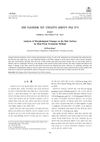 April 2023 in “Han'gug miyong haghoeji/Journal of the Korean society of cosmetology”
April 2023 in “Han'gug miyong haghoeji/Journal of the Korean society of cosmetology” Direct heat perms cause more damage to hair than softening heat perms.
 January 2023 in “Laryngoscope”
January 2023 in “Laryngoscope” Platelet-rich plasma (PRP) can help restore hair, but the best method for preparing and using it is still unclear.
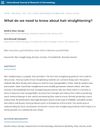 August 2021 in “International Journal of Research in Dermatology”
August 2021 in “International Journal of Research in Dermatology” Modern hair straightening improves manageability and strength while maintaining natural waves.
The best way to apply vitamin C to the skin is with a nanostructured lipid carrier formulation.
September 2019 in “PubMed” The conclusion suggests using a science-based, multi-targeted treatment for hair loss instead of just biotin.
January 2018 in “Journal of human virology & retrovirology” Lifestyle drugs are mainly used by wealthy people in India but could spread to others, affecting society and youth.
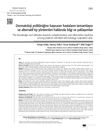 December 2015 in “Turkderm”
December 2015 in “Turkderm” About 30% of dermatology patients used complementary and alternative medicine, mostly women with higher education and income, but 85% still preferred traditional medical treatments.
 February 1999 in “Strength and Conditioning Journal”
February 1999 in “Strength and Conditioning Journal” Androstenedione, a hormone supplement, doesn't improve muscle or performance and can cause harmful side effects.
January 2023 in “The Egyptian Journal of Hospital Medicine” Dutasteride is effective for treating hair loss.
 287 citations,
January 2013 in “Journal of Ginseng Research”
287 citations,
January 2013 in “Journal of Ginseng Research” The ginseng market has potential for growth and needs new products and better marketing.
150 citations,
July 2001 in “Clinics in dermatology” Proper haircare and communication with doctors are key to managing hair loss and avoiding damage.
 138 citations,
October 2012 in “Behavioral Ecology”
138 citations,
October 2012 in “Behavioral Ecology” Masculine facial features may not reliably indicate heritable health, and more research is needed.
 78 citations,
January 2017 in “Skin appendage disorders”
78 citations,
January 2017 in “Skin appendage disorders” Biotin supplements may improve hair and nail growth in people with certain deficiencies or conditions, but there's not enough evidence to recommend it for healthy individuals.
69 citations,
April 2010 in “Clinical ophthalmology” Bimatoprost is effective for growing longer, thicker, and darker eyelashes.
 64 citations,
May 2019 in “Materials Science and Engineering: C”
64 citations,
May 2019 in “Materials Science and Engineering: C” Microneedle technology has improved drug delivery and patient comfort but needs more research for broader use.
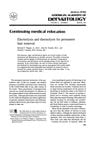 58 citations,
March 1985 in “Journal of The American Academy of Dermatology”
58 citations,
March 1985 in “Journal of The American Academy of Dermatology” The document concludes that electrolysis and thermolysis can permanently remove hair but calls for better regulation to ensure safety, and notes a possibility of hair regrowth and rare complications.
39 citations,
June 1999 in “Seminars in cutaneous medicine and surgery” Optical hair removal devices showed potential for long-term hair removal in 1999.
 35 citations,
April 2006 in “Ocular Surface”
35 citations,
April 2006 in “Ocular Surface” Cosmetics and procedures can cause eye issues, from mild discomfort to serious conditions, due to allergies, toxins, or poor care.
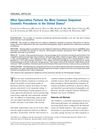 30 citations,
January 2008 in “Dermatologic Surgery”
30 citations,
January 2008 in “Dermatologic Surgery” Dermatologists perform most outpatient cosmetic procedures in the U.S., especially on white women aged 40 to 59.
 29 citations,
June 2013 in “Journal of the Saudi Society of Dermatology & Dermatologic Surgery”
29 citations,
June 2013 in “Journal of the Saudi Society of Dermatology & Dermatologic Surgery” Alopecia areata is an autoimmune hair loss condition treated with corticosteroids, and histologic confirmation is the best diagnosis method.
 20 citations,
December 2016 in “American Journal of Clinical Dermatology”
20 citations,
December 2016 in “American Journal of Clinical Dermatology” Men prefer less invasive cosmetic procedures and need different treatment approaches than women.
 19 citations,
December 2020 in “Plastic and Reconstructive Surgery”
19 citations,
December 2020 in “Plastic and Reconstructive Surgery” Platelet-rich plasma is used for facial and hair treatments, showing benefits despite varying methods and limited research.























